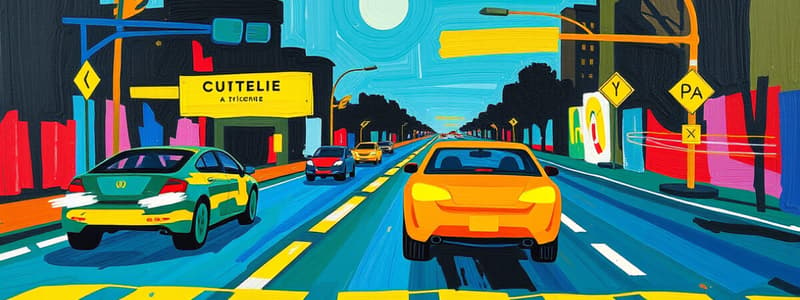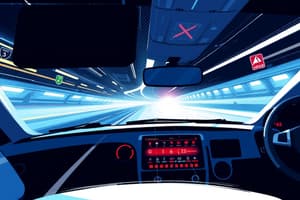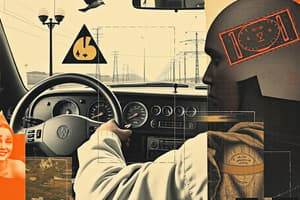Podcast
Questions and Answers
Which of the following are driver-contributed risks? (Select all that apply)
Which of the following are driver-contributed risks? (Select all that apply)
- Bald Tires
- Adjusting Radio (correct)
- Having Blurred Vision (correct)
- Drinking While Driving (correct)
What is the acronym IPDE stand for?
What is the acronym IPDE stand for?
Identify, Predict, Decide, Execute
What are vehicle-contributed risks? (Select all that apply)
What are vehicle-contributed risks? (Select all that apply)
- Bright Sun
- Bad Brakes (correct)
- Construction
- Bald Tires (correct)
What are environment-contributed risks? (Select all that apply)
What are environment-contributed risks? (Select all that apply)
Use orderly visual search pattern to ____________:
Use orderly visual search pattern to ____________:
Use knowledge, judgment, and experience to ____________:
Use knowledge, judgment, and experience to ____________:
____________ to use one or more actions to:
____________ to use one or more actions to:
____________ your decisions to:
____________ your decisions to:
What does commentary driving involve?
What does commentary driving involve?
What is meant by 'space cushion'?
What is meant by 'space cushion'?
What is the purpose of the Smith System?
What is the purpose of the Smith System?
What is an open zone?
What is an open zone?
What should you look for when driving?
What should you look for when driving?
What does 'compromise space' refer to?
What does 'compromise space' refer to?
Define 'traction.'
Define 'traction.'
What are the responsibilities when executing a decision?
What are the responsibilities when executing a decision?
What is the 'line of sight'?
What is the 'line of sight'?
The orderly visual search pattern should always be the same.
The orderly visual search pattern should always be the same.
Match the following terms with their definitions:
Match the following terms with their definitions:
Flashcards are hidden until you start studying
Study Notes
Driver-Contributed Risks
- Distractions that impair driving include adjusting the radio, anger, blurred vision, grooming, drinking alcohol, and using mobile phones.
- Distracted driving increases the likelihood of accidents.
Contributing Risks
- Driving risk is influenced by driver-contributed, vehicle-contributed, and environment-contributed factors.
Vehicle-Contributed Risks
- Factors affecting vehicle safety include bald tires, inadequate brakes, dirty windshields, broken headlights, and worn windshield wipers.
Environment-Contributed Risks
- Environmental hazards include bright sunlight, road construction, shadows, snow and ice, and sharp curves.
IPDE Process
- The IPDE process involves four key steps: Identify, Predict, Decide, Execute.
Identify
- Utilize a systematic visual search pattern to recognize open and closed zones, roadway features, traffic controls, and other road users.
Predict
- Based on knowledge and experience, anticipate actions of other vehicles, their speed and direction, and potential points of conflict.
Decide
- Choose actions to change or maintain speed, alter direction, and effectively communicate with other road users.
Execute
- Implement decisions by controlling speed, steering, communicating effectively, and combining necessary actions.
Commentary Driving
- A technique where drivers verbalize their thought process aloud, enhancing focus by articulating identification, predictions, and decisions.
Space Cushion
- The area around your vehicle that provides buffer space and visibility to react effectively.
Smith System
- A method to foster effective seeing habits, including:
- Aim high in steering.
- Keep your eyes moving.
- Get the big picture.
- Ensure visibility to others.
- Have an "out" for escape.
Zone Control System
- A strategy for managing six zones around a vehicle, enabling timely responses to traffic changes, comprising:
- Observing zone changes.
- Checking other areas.
- Optimizing speed and communication.
Zones
- Open zone: An unrestricted area for driving.
- Closed zone: A space that is obstructed, limiting travel.
- Target area: The roadway section where the target is central to the intended path.
Visual Ranges
- Target area range: Distance from vehicle to target area for potential changes.
- 12-15 second range: Area traveled in the next 12-15 seconds; essential for identifying upcoming changes.
- 4-6 second range: Distance traveled in the next 4-6 seconds; used for final updates on intended path.
Orderly Visual Search Pattern
- A sequence for checking critical areas, such as target area and speedometer, ensuring comprehensive situational awareness.
Vision Types
- Field of vision: Overall area visible while looking straight ahead.
- Central vision: Sharply viewed area up to 10 degrees.
- Peripheral vision: Side view outside central vision.
Key Driving Techniques
- Aim high in steering: Look ahead 12-15 seconds.
- Keep eyes moving: Regularly scan near and far.
- Get the big picture: Anticipate unseen risks in the driving environment.
- Ground viewing: Quick glances at roadway conditions for potential hazards.
Communication Methods
- Utilize vehicle lights (headlights, brake lights), turn signals, horn, body language, and positioning to convey intentions.
Minimizing Hazards
- Increase distance from hazards, adjust speed, communicate effectively, and maneuver strategically to enhance safety.
Outcomes of IPDE Process
- Enhanced visibility, accurate decision-making, and more successful execution of driving maneuvers.
Additional Terms
- Traction: Gripping ability of tires on the roadway.
- Lane Positions: Defined variations in lane positioning for effective driving strategies (positions 1, 2, and 3).
Hazard Management Strategies
- Minimize hazards by reducing conflict potential via distance.
- Separate hazards to address them one at a time.
- Compromise space by yielding more to greater hazards.
Studying That Suits You
Use AI to generate personalized quizzes and flashcards to suit your learning preferences.




